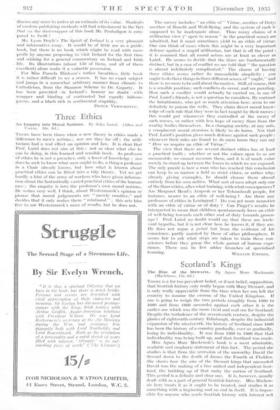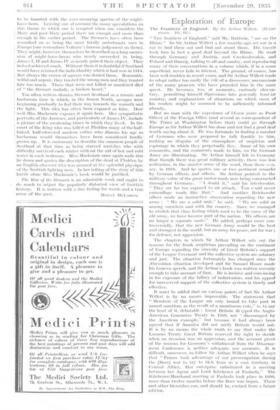Scotland's Kings
The Rise of the Stewarts. By Agnes Mare Mackenzie. (Maclehose, 12s. 6d.) THERE is a far too prevalent belief, or if not belief, supposition, that Scottish history only really began with Mary Stewart, and is only really appreciable from the time when her son left the country to assume the crowns of the United Kingdom. If one is going to weigh the two periods (roughly from 1300 to 1000 and from 1600 onwards) against each other it is the earlier one which was the more vivid and real one for Scotland. Despite the turbulence of the seventeenth century, despite the glories of eighteenth-century Edinburgh, despite the industrial expansion of the nineteenth, the history of Scotland since 1600 has been the history of a country gradually, ever's° gradually, losing its individuality. It was from 1300 to 1600 that that individuality was being built up, and that Scotland was made.
Miss Agnes Mure Mackenzie's book is a most admirable, readable and emphatic statement of this fact • The period she studies is that from the accession of the unworthy David the Second down to the death of Janies the Fourth at Flodden. She shows how the aim of the Stewart kings that succeeded David was the making of a free united and independent Scot- land, the building up of that unity the nation of Scotland. This period is a definite and clear one. It is, however, usually dealt with as a part of general Scottish history. Miss Macken-; zie here treats it as it ought to be treated, and studies it as something with a beginning and an end in itself. It is impos- sible for anyone who reads Scottish history with interest not to be haunted with the ever-recurring spectre of the might- have-been. Leaving out of account the ninny speculations on this theme to which one is tempted when one considers the Mary and post-Mary period there are enough and more than enough in the earlier period. The Stewarts have often been remarked on as being the most fatally unfortunate race in Europe (one remembers Voltaire's famous judgement on them). They might.however, themselves be described as a long succes- sion of might-]lave-beens who nearly succeeded in being. Jaikies 1, II and James IV so nearly gained their object. They indeed :all lewd Inn eh. Without their it is doubtful if Scotland woo Li have re a ilE`i 1 the individuality which it had won in 1314. But always the crown of success was denied them. Romantic, wilful and urgent, they trusted the wrong men and they trusted fate •too much, Those that were not killed or murdered died of " the Stewart malady, a broken heart."
Too often writers dismiss Stewart Scotland as a remote and barbarous time in which, in the frozen North, savages were beginning gradually to feel their way towards the warmth and the light. This idea has often been exposed as false. How well Miss Mackenzie exposes it again here. Her sympathetic portraits of the Jameses, and particularly of James 1V, include a picture of the awakening,times in which they lived. In the court of the King who was killed at Flodden many of the half- baked, half-educated modern critics who dismiss his age as barbarous would themselves have been considered hardly grown up. It is customary to describe the common people of Scotland at that time as being starved wretches who with difficulty survived each winter withaut the aid of hot and cold . water in each bedroom. Miss Mackenzie once again nails this lie down and quotes the description of the dead at Flodden by an English observer who was amazed at the splendid physique of the Scottish fighting men. In her telling of the story of this battle alone Miss Mackenzie's book would be justified.
The Rise of the Siewarts is an admirable work and ought to
• • do much to adjust the popularly distorted view of Scottish history. It is written with a fine feeling for words and a true













































 Previous page
Previous page